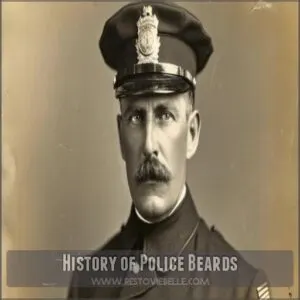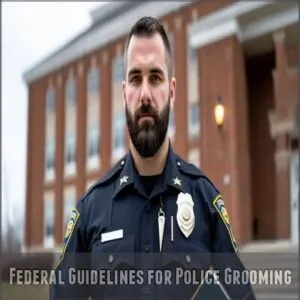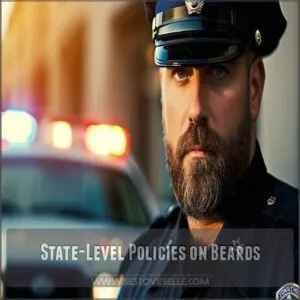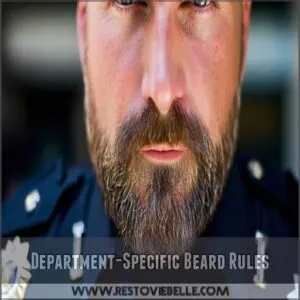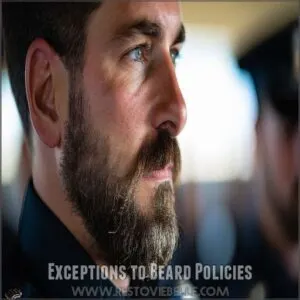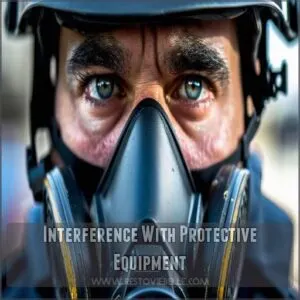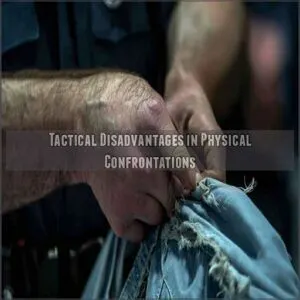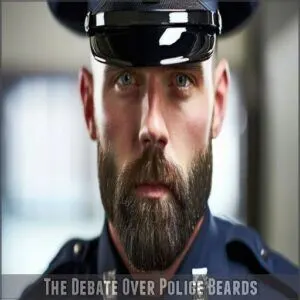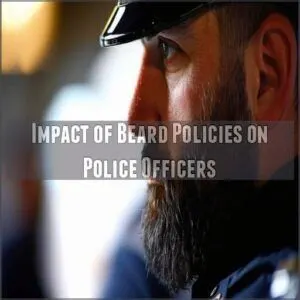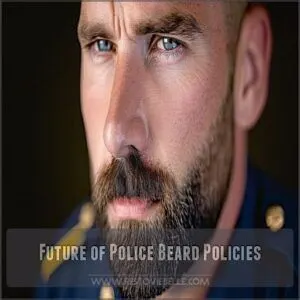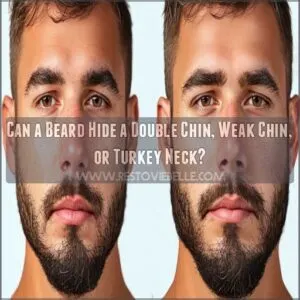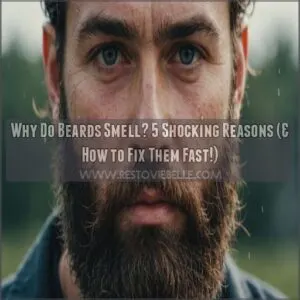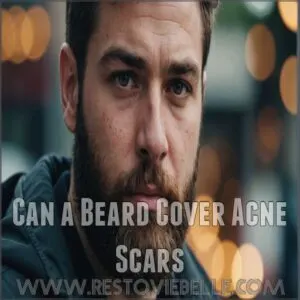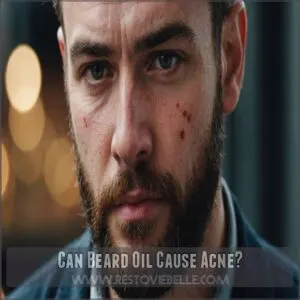This site is supported by our readers. We may earn a commission, at no cost to you, if you purchase through links.
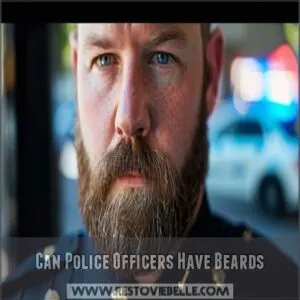 You’ll find that whether police officers can have beards varies by department.
You’ll find that whether police officers can have beards varies by department.
While some agencies embrace the growing trend of allowing facial hair, others maintain strict no-beard policies.
Most departments that permit beards require them to be neat, trimmed, and no longer than 1/2 inch.
Medical conditions like pseudofolliculitis barbae and religious beliefs often qualify for exceptions.
Safety considerations play a key role, particularly regarding proper sealing of protective masks and equipment.
Today’s departments are increasingly balancing traditional standards with modern grooming preferences, leading to some interesting shifts in policy that reflect changing attitudes about professionalism in law enforcement.
Table Of Contents
- Key Takeaways
- History of Police Beards
- Can Police Officers Have Beards
- Facial Hair Regulations in Law Enforcement
- Exceptions to Beard Policies
- Safety Concerns With Police Beards
- Balancing Professionalism and Personal Expression
- The Debate Over Police Beards
- Impact of Beard Policies on Police Officers
- Future of Police Beard Policies
- Frequently Asked Questions (FAQs)
- Can a police officer have a beard?
- Can a police officer shave a beard for religious reasons?
- Does law enforcement have a policy on beards & grooming standards?
- How long can a police officer’s beard be?
- Are cops allowed facial hair?
- Can you have a beard in the lapd?
- Are male police officers allowed to have long hair?
- Can Texas state troopers have facial hair?
- What beard styles are typically allowed for police officers?
- Do undercover officers follow the same beard rules?
- How do police beard policies differ internationally?
- Can female officers request facial hair accommodations?
- Do police academies allow facial hair during training?
- Conclusion
Key Takeaways
- You’ll find that most police departments allow beards, but they must be neat and trimmed to a maximum length of 1/2 inch.
- You’ll need to check your specific department’s policy, as rules vary widely—from complete bans to flexible grooming standards that accommodate religious beliefs and medical conditions.
- You can’t wear a beard if it interferes with protective equipment like respirators and masks, as proper sealing is essential for officer safety.
- You’ll notice departments are increasingly relaxing their beard policies to improve recruitment, boost morale, and better reflect the diverse communities they serve.
History of Police Beards
You’ll be surprised to learn that beards were once a common sight in early police forces, where they symbolized authority and masculine power.
Law enforcement became more professional in the early 20th century.
Departments started requiring a clean-shaven look to promote uniformity and a more modern image.
Early Acceptance in Police Forces
Nearly every police officer in the 19th century sported some form of facial hair.
Back then, a thick mustache or well-groomed beard wasn’t just a style choice – it was a symbol of authority and masculinity in law enforcement.
You’d find officers proudly wearing everything from handlebar mustaches to full beards, reflecting the broader social norms of the Victorian era.
Police departments actively encouraged facial hair, believing it helped officers command respect on their beats.
This early acceptance of beards created a strong foundation for today’s ongoing discussions about facial hair in law enforcement.
Evolution of Grooming Standards
While facial hair once symbolized authority and masculinity in early police forces, the push for uniformity transformed grooming standards.
As law enforcement professionalization took hold, departments shifted toward a clean-shaven look to project a more disciplined image.
With federal guidelines prohibiting discrimination based on religion, religious exemptions for beards also influenced the evolution of these standards.
Key changes that shaped modern police grooming standards:
- Military influence brought stricter appearance rules in the 1940s-50s
- Safety concerns arose with the introduction of protective gear in the 1970s
- Cultural shifts in the 1990s sparked debates about personal expression
Today’s standards balance professionalism with individual needs, though you’ll find they vary greatly between departments.
Can Police Officers Have Beards
The short answer is yes – police officers can have beards, but it’s not that simple.
Most departments allow facial hair with specific restrictions on length and style.
You’ll typically need to keep your beard neat, trimmed, and under half an inch in length.
Some departments are more lenient, while others maintain stricter grooming standards.
The key is checking your specific department’s policy, as rules vary greatly across regions and jurisdictions.
It’s a mix of balancing professional appearance with personal expression, much like the evolving attitudes we’ve seen throughout law enforcement history.
Facial Hair Regulations in Law Enforcement
You’ll find that facial hair regulations in law enforcement vary widely across federal, state, and department levels, with each agency setting its own specific guidelines.
While some departments maintain strict no-beard policies, others have adapted their rules to accommodate religious beliefs, medical conditions, and changing cultural norms in modern policing.
Federal Guidelines for Police Grooming
Federal regulations shape how police departments handle facial hair policies nationwide.
You’ll find guidelines from the EEOC that protect officers from discrimination while maintaining professional standards, emphasizing the importance of a well-groomed appearance, such as a clean shaven vs beard, to uphold public trust.
These rules set the foundation for department-specific policies, covering everything from basic grooming requirements to religious accommodations.
For officers wondering about facial hair options, federal guidelines serve as your starting point for understanding what’s allowed.
State-Level Policies on Beards
State laws across America shape how officers can sport facial hair, creating a patchwork of policies that can feel like figuring out a maze.
You’ll find significant variations depending on where you’re located.
For more specific details on state beard laws, check out the rules in your state here.
Here’s what typically varies by state:
- Minimum and maximum beard lengths
- Grooming inspection schedules
- Legal protections for religious and medical accommodations
Recent legal challenges have pushed many states to adopt more flexible approaches to facial hair policies.
Department-Specific Beard Rules
Within police departments, beard rules can vary widely from precinct to precinct. You’ll find that most departments set specific guidelines for facial hair maintenance and grooming standards.
| Department Type | Typical Beard Length | Common Restrictions |
|---|---|---|
| Urban Police | 1/2 inch maximum | Neat, trimmed edges |
| State Patrol | No beards allowed | Medical exceptions only |
| Sheriff’s Office | 1/4 inch maximum | Must maintain shape |
| Transit Police | 3/4 inch maximum | Weekly grooming check |
| Federal Agency | Case-by-case basis | Strict approval process |
Exceptions to Beard Policies
You’ll find that police departments make specific exceptions to their no-beard policies for religious beliefs, cultural traditions, and medical conditions that affect facial hair growth.
If you’re seeking an exception to your department’s beard policy, you’ll need to understand these three main categories of exemptions that departments typically consider.
Religious Accommodations for Police Beards
How do religious accommodations affect police beard policies?
When your faith requires facial hair, departments must consider religious freedom protections.
Here’s what you need to know:
- Officers must formally request religious exemptions
- Departments evaluate sincerely held religious beliefs
- Reasonable accommodations balance faith and safety
- Modified grooming standards may apply for certain equipment
These accommodations stem from legal precedents protecting religious expression in law enforcement.
Cultural Considerations in Beard Policies
Police departments across the U.S. increasingly recognize cultural traditions in their facial hair policies.
You’ll find that many departments now allow beards to accommodate officers from diverse ethnic backgrounds where facial hair holds special significance.
Department policies often consider cultural practices alongside religious beliefs, reflecting America’s diverse law enforcement community.
This flexibility helps create an inclusive environment while maintaining professional standards.
Medical Exemptions for Beard Restrictions
Beyond religious and cultural considerations, medical conditions can lead to approved beard exceptions.
If you’re dealing with skin conditions like pseudofolliculitis barbae (PFB) or severe acne, you’ll need documentation from a healthcare provider.
Most departments require periodic medical reviews to maintain these exemptions.
Remember, even with a medical waiver, you’ll still need to keep your facial hair neat and within specified length requirements.
Safety Concerns With Police Beards
You’ll want to think about how your beard might affect your safety on the job, as facial hair can prevent protective masks from creating a proper seal against your face.
You’ll want to think about how your beard might affect your safety on the job, as facial hair could also give suspects something to grab onto during physical confrontations, potentially putting you at a tactical disadvantage.
Interference With Protective Equipment
One critical safety concern arises when facial hair interferes with essential protective equipment.
You’ll find that beards can prevent proper mask seals, compromising your safety during hazardous situations.
A respirator fit test typically requires a clean-shaven face to guarantee airtight protection.
Even stubble can create gaps between your skin and the breathing apparatus, potentially exposing you to harmful substances.
That’s why departments often require officers to maintain facial hair that doesn’t impact equipment compatibility.
Think of it like a diving mask – you need that perfect seal to stay safe underwater.
Tactical Disadvantages in Physical Confrontations
While protective equipment poses risks, physical confrontations present their own challenges for officers with facial hair.
Long beards can become a dangerous liability during scuffles, giving suspects something to grab onto. You’ll find that even shorter facial hair might snag on equipment or get caught during close-quarter interactions.
Studies show that beards can affect an officer’s peripheral vision, especially when wearing protective gear. Plus, there’s a higher risk of facial injuries when beard hair gets pulled or twisted during altercations.
That’s why many departments strictly regulate beard length for active-duty officers.
Balancing Professionalism and Personal Expression
You’ll find that modern police departments are working to strike a balance between maintaining professional standards and allowing officers to express their individuality through facial hair.
While you’re required to follow specific grooming guidelines, many departments now recognize that a well-maintained beard can project both authority and authenticity to the communities you serve.
Uniformity and Public Perception
Police departments’ commitment to uniformity plays a key role in maintaining public trust.
Looking sharp and professional isn’t just about following rules – it’s about meeting community expectations.
A man’s appearance, including his hairstyle choice, such as whether do girls like guys with long hair, can greatly impact how he’s perceived by others.
Here’s why appearance matters:
- A consistent, clean-cut image helps citizens quickly identify and trust officers
- Professional grooming standards signal discipline and attention to detail
- Uniform appearance across departments reinforces a sense of authority
Think of it like a sports team’s uniform – when everyone looks polished and professional, it builds confidence in the organization’s capabilities and readiness to serve.
This uniformity directly impacts how effectively officers can do their jobs.
Community Connection and Officer Individuality
Beyond maintaining a polished image, facial hair can bridge gaps between officers and their communities.
You’ll notice some departments now recognize that allowing officers to express their individuality through well-maintained beards helps them connect with residents more naturally.
Many officers take pride in their appearance, often shopping for specialized products like police facial hair to keep their beards looking their best.
This personal touch often makes officers more approachable, especially in diverse neighborhoods where facial hair holds cultural significance.
Think of it like this: when community members see officers who look more like them, they’re more likely to open up and build lasting relationships, strengthening the foundation of community policing.
The Debate Over Police Beards
You’ll find that police departments across the country are wrestling with whether to allow officers to wear beards, balancing personal expression with safety concerns.
Grooming policies are being loosened by some departments to attract recruits and boost morale.
Others maintain strict no-beard rules to guarantee equipment compatibility and maintain a uniform appearance.
Arguments for Allowing Beards
Advocates for facial hair in law enforcement point to several compelling benefits that strengthen both officer well-being and community relations. They argue that allowing beards helps create a more inclusive and diverse police force that better reflects the communities they serve. For those interested in learning more about specific police beard rules and products, there are various resources available to help navigate department policies.
Key benefits of allowing police beards include:
- Improved recruitment by attracting candidates from diverse cultural backgrounds
- Enhanced community connection, making officers appear more approachable
- Increased job satisfaction and morale through personal expression
- Better retention of experienced officers who prefer maintaining facial hair
This shift toward flexibility shows how departments are adapting to modern workplace expectations while maintaining professionalism.
Arguments Against Allowing Beards
Critics raise legitimate concerns about facial hair in law enforcement.
While beards might seem harmless, they can compromise officer safety by preventing proper seals on protective masks and respirators.
There’s also the hygiene factor – beards require extra maintenance to keep clean and professional-looking.
Some departments worry that facial hair disrupts uniformity, potentially affecting public perception and team cohesion.
Others point out that beards could appear less authoritative to certain community members, especially in formal situations.
The complexity of modern policing demands clear standards that prioritize safety and professionalism over personal expression.
Impact of Beard Policies on Police Officers
You’ll find that beard policies can greatly affect your career options and daily work life as a police officer, with rules varying widely between departments.
If you’re considering growing a beard, you’ll need to check your department’s specific regulations and understand the process for requesting accommodations, which might require medical documentation or religious justification.
Variations in Policy Across Departments
Police departments across the U.S. handle facial hair policies differently, leading to a patchwork of regulations that can perplex both new and veteran officers.
You’ll find notable variations in:
- Beard length limits, ranging from stubble-only to well-maintained quarter-inch growth
- Acceptable facial hair styles, with some departments allowing full beards while others restrict to goatees
- Monitoring methods, from weekly grooming checks to photo documentation
These differences often reflect each department’s unique culture and community standards.
What’s permitted in an urban California precinct mightn’t fly in a rural Texas department, showcasing how local values shape policy enforcement.
Process for Requesting Beard Accommodations
Getting your beard approved isn’t as tough as climbing Mount Everest – you just need to know the steps.
Here’s a clear breakdown of what you’ll need:
| Step | Required Action |
|---|---|
| 1 | Submit written request to supervisor |
| 2 | Provide medical or religious documentation |
| 3 | Meet with department review board |
| 4 | Complete required forms and waivers |
| 5 | Schedule equipment fit testing |
Remember, most departments will process your request within 30 days.
If you’re denied, you’ve got options – including filing an appeal or seeking union representation to support your case.
Future of Police Beard Policies
You’ll see more police departments adopting flexible beard policies as they balance professional standards with personal expression and cultural diversity.
While individual departments will continue setting their own grooming rules, there’s a growing push toward standardized state or federal guidelines that could create more consistency across law enforcement agencies.
Trends Towards More Flexible Grooming Standards
Many departments are shifting away from rigid grooming rules, recognizing the benefits of more flexible standards.
Research shows that facial hair, like beards, can actually boost confidence and perceived masculinity, as discussed in the science behind beards and masculinity.
You’ll notice a growing acceptance of neatly trimmed facial hair, which has also led to the understanding that some ethnicities may struggle with ethnicities with sparse beards, reflecting today’s emphasis on diversity and inclusion.
This modernization helps departments attract qualified candidates while boosting officer well-being and job satisfaction.
Progressive policies now allow for well-maintained beards, goatees, and mustaches that meet professional standards.
Public perception has also evolved, with communities increasingly viewing facial hair as compatible with effective law enforcement, breaking down outdated stereotypes about officer appearance.
Potential for Standardized State or Federal Policies
Looking ahead, there’s growing momentum toward creating unified beard policies across all law enforcement agencies.
While current regulations vary widely between departments, standardized federal guidelines could streamline enforcement and reduce confusion.
You’ll likely see more departments adopting flexible grooming standards that balance professionalism with personal expression.
Legal challenges continue to shape these policies, pushing for clearer rules on religious and medical exceptions.
Until then, you’ll need to check your specific department’s regulations, as they’re ultimately responsible for setting and enforcing facial hair guidelines.
Frequently Asked Questions (FAQs)
Can a police officer have a beard?
Police departments typically set their own beard policies.
You’ll need to check your specific department’s rules.
Many now allow neat, trimmed facial hair while some restrict it for safety or professional appearance reasons.
Can a police officer shave a beard for religious reasons?
Religious freedoms protected by law allow you to maintain facial hair.
Religious beliefs will need to be accommodated while meeting safety requirements for protective equipment.
You’ll need to work with your department to make sure this happens.
Does law enforcement have a policy on beards & grooming standards?
Most departments have specific grooming policies that vary by location.
You’ll find rules about beard length, maintenance standards, and exceptions for religious or medical reasons.
These policies aim to balance professionalism with personal needs.
How long can a police officer’s beard be?
Department policies typically limit beard length to 1/4 or 1/2 inch, keeping it neat and trimmed. You’ll need to maintain professional appearance while ensuring your facial hair doesn’t interfere with safety equipment.
Are cops allowed facial hair?
Yes, many police agencies allow facial hair, but there’s usually a catch.
You’ll need to keep it neat and trimmed, typically under 1/2 inch, and it can’t interfere with safety equipment like masks.
Can you have a beard in the lapd?
Like many departments, LAPD’s beard policy is strict.
You can’t grow a full beard, but you’re allowed well-groomed facial hair that’s no longer than a quarter inch.
Medical exceptions may apply.
Are male police officers allowed to have long hair?
Most police departments require male officers to maintain short, neat hair that doesn’t touch their collar or ears.
Grooming policy
You’ll need to check your specific department’s grooming policy for exact length requirements and exceptions.
Can Texas state troopers have facial hair?
Texas state troopers can’t sport facial hair except for neatly trimmed mustaches that don’t extend beyond the corners of your mouth.
You’ll need to keep your face clean-shaven to maintain the department’s professional standards.
What beard styles are typically allowed for police officers?
Police departments typically allow well-maintained goatees, short beards, and neatly trimmed mustaches that don’t interfere with safety equipment.
You’ll need to keep facial hair under 1/4 inch and maintain clean, defined edges.
Do undercover officers follow the same beard rules?
Like chameleons adapting to their environment, undercover officers aren’t bound by standard grooming policies.
Undercover officers are granted special exemptions to blend in seamlessly with their surroundings and maintain effective cover during operations.
How do police beard policies differ internationally?
International beard policies vary widely for officers.
You’ll find strict clean-shaven rules in Japan,
relaxed standards in Nordic countries,
and religious accommodations in India and the UK.
Canada allows neatly trimmed facial hair.
Can female officers request facial hair accommodations?
Female officers face unique challenges when requesting facial hair accommodations.
While medical conditions like PCOS may cause facial hair growth, you’ll need to discuss specific grooming accommodations with your department’s HR representative for guidance.
Do police academies allow facial hair during training?
Most police academies maintain strict grooming standards during training, requiring you to be clean-shaven.
You’ll need to follow these rules unless you’ve got approved medical or religious accommodations – it’s part of building discipline.
Conclusion
Like sorting through a maze of regulations, understanding whether police officers can have beards requires careful consideration of department policies.
While some agencies embrace facial hair, others maintain strict grooming standards.
You’ll find that religious beliefs, medical conditions, and changing social norms continue to shape these policies.
Whether you’re considering a career in law enforcement or simply curious, remember that beard policies vary widely and are evolving to reflect modern professional standards.
